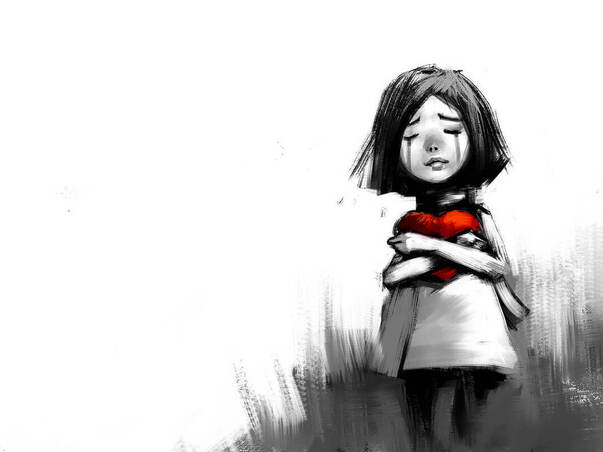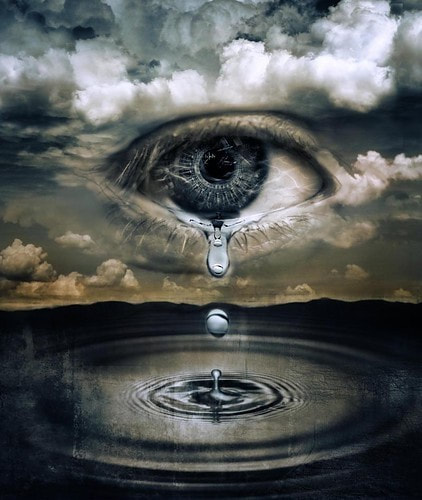Why do we Cry?

Last night I had the most horrible dream. The type of dream that isn’t at all subtle and brings all your worries to the surface. It actually woke me up crying, which is really weird as I’m not much of a crier! I can’t say that I’m not prone to the odd tantrum and door slamming episode when I’m not getting my own way, but most of the time, I and the rest of my family have a more ‘British stiff upper lip, let’s get on with things the best we can’ approach to life.
Why we cry
I think when I do resort to tears it is more likely to be through frustration than anything else. They, whoever they are, say women at work must be professional and never cry, however it isn’t always possible to rein in emotions. I remember a couple of years ago feeling so frustrated that a very poorly colleague and friend of mine wasn’t getting a fair deal at work. Ironically it was only when angry tears leaked out that things started to happen to improve her situation. It seems tears can be powerful. Whilst I am opposed to pretty much everything Theresa May stands for, I still felt sorry for her as she struggled to contain her emotions as she stood outside Number 10 the other day. Tears also seem to be a trigger for sympathy and empathy.

Being Prejudiced
Revealing our prejudices
Reflecting on how we respond to tears is I think, quite revealing, though having just done so, I’ve realised it doesn’t necessarily show us in the best of lights. For me, I think it has, once again made me realise just what a sexist feminist I actually am! Recently I have:
- Encountered the tears of a 50 plus woman and instead of addressing the reason behind the tears, assumed they are the result of hormones and largely ignored the issue behind them. I have now given myself a thorough telling off about this!
- Encountered a male colleague bursting into tears over a work decision that had gone against him. I felt far more awkward than if the colleague had been female. In this situation athough I’ve told myself off for being sexist, I do think he should have been a bit more mature! I probably judged him more harshly than I would a woman or child doing the same.
- Encountered a young person in tears and been prepared to cut off my right arm to fix the situation for them. I need to be maybe less sensitive to tears as a trigger and let them run their course without thinking it is the end of th world.
- Felt great empathy for a male friend whose personal very sad circumstances drove him to tears, but felt awkward nevertheless. Once again, I need to stop being so sexist.
It’s interesting isn’t it how we respond to the tears of others. Perhaps they are not as relevant as I’m suggesting and just a trigger for an outward manifestation of feelings that we already hold. Or alternatively perhaps our responses do reflect our ageist and sexist society and how we are unable to fully ever extricate ourselves from it.
Manipulating Tears
A lot of our response to tears is probably at an unconscious level, but I wonder how many of us can actually ‘turn on the tears’ or use them to our advantage. I wouldn’t say I’m good at this, but there have been occasions, even recently when I’ve known crying will lessen the negative consequences of a situation. For example, when I recently crashed the car the other driver was far more sympathetic than he might have been once he saw a middle aged woman with a wobbly lip emerge from the other vehicle! I’ve got a feeling that women do manipulate tears far more than men because it is seen as acceptable to do so. I’m trying to figure out what the parallel for men is.
The Benefits of Crying
Crying is a good thing
We mustn’t forget the good side to tears:
The emphasis of young people on improving mental health and encouraging boys and girls to cry from a young age has got to be a positive. I wonder though if all teachers and parents have really caught up with this concept. I very much suspect in homes and classrooms across the world right now boys are being tussled out of their tears with rough play as girls are being cuddled out of theirs. I might be wrong, of course, but it is interesting to consider how we do treat young children differently. This study shows how gender stereotyping in managing tears starts at as young as three years old.
There is nothing better than a cathartic cry at a good book and who can deny the benefits of a proud mum’s tears at a school concert. I’ve got a feeling my own kids might actually judge my level of pride at their success on whether the waterworks get turned on or not. Betsy asked me if I cried at her IB graduation and seemed slightly perturbed that I did not! Looking at language for a moment, what an interesting phrase ‘turning on the water works is. I can’t quite figure out if it is negative or not.
I recently felt pretty close to tears when a very successful blogger and influencer, Middle Aged Mamma, mentioned me in her own blog. Check it out here. I’m not sure if my tears would have been 50-something hormone driven, or just sheer gratitude led. As there was no one else there around I guess I can’t be accused of trying to manipulate my audience!
Anyway, next time you’re driven to tears, or perhaps after they’ve dried up, why not take a moment to analyse what they reveal about yourself. The result might just suprise you!